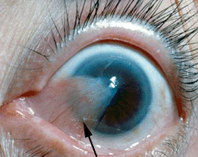About Pterygium.
The primary symptom of a pterygium is a painless area of elevated white tissue on the inner or outer edge of the cornea. The best way to avoid getting a pterygium is to wear sunglasses when outdoors. Wrap-around type sunglasses with 100% U.V. protection work the best. If a pterygium gets in the way of your vision or causes constant irritation to your eye, you may want to have it removed. During your pterygium surgeryYour eye will be numbed with drops and an injection. A device will be placed around your eye to keep you from blinking. The pterygium growth will then be peeled away from the eye and surgically removed. Generally, no stitches are required.After your pterygium surgeryDr. Kindermann may put a patch over your eye. You will need to have someone drive you home . It's normal for patients to spend at least one full day resting with their head elevated while using ice packs to reduce swelling. You may have a dull headache or slight discomfort. You'll need to use eye drops or ointment for several weeks as your eye heals.Risks and possible complicationsAs with any surgery, there are some risks to pterygium surgery, including infection. The most common complication is the regrowth of the pterygium. |
 (856) 667-3937Kindermann Eye Associates |
Eye Doctor South Jersey Kindermann Eye Associates - 3001 Chapel Avenue, Suite 200, Cherry Hill, New Jersey 08002Excellence in eye care for patients seeking a quality caring eye doctor in South Jersey. Dr. W Reed Kinderman is a premier ophthalmologist, New Jersey eye surgeon, specializing in cataract surgery, refractive surgery, laser guided cataract surgery, Tecnis multifocal lens implant, ReStor intraocular lens, Crystalens, Toric intraocular lens, glaucoma, strabismic eye muscle disorders, ophthalmology, and the full spectrum of eye care in New Jersey, Delaware Valley, Philadelphia, Mullica Hill, Ashland, Echelon, Thorofare, Riverton and surrounding areas. |

 A pterygium is a raised growth on the surface of the eye. This happens primarily because of sun damage or long-term irritation from dry, dusty conditions. Normally, a pterygium grows on the inner side of the pupil, on the white of the eye.
A pterygium is a raised growth on the surface of the eye. This happens primarily because of sun damage or long-term irritation from dry, dusty conditions. Normally, a pterygium grows on the inner side of the pupil, on the white of the eye.